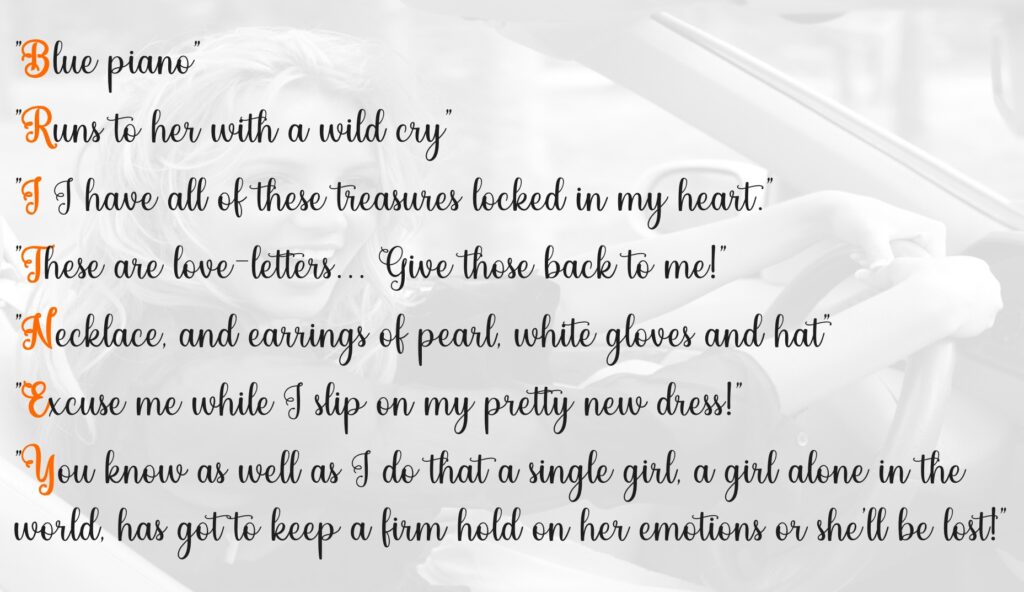What do pop icon Britney Spears and Tennessee Williams’ Blanche DuBois have in common? Uh, how about A LOT! Raised in Southern America, forced to adhere to a rulebook written by men, sucked into a class war as well as a gender one, then sectioned by the very institutions that should have taken care of them, both real-life singer, Britney, and imagined tragic heroine, Blanche, stand as indictments of the world’s warped attitudes towards women.
- MUSIC FOCUS: Britney Spears.
- ACTIVITY FOCUS: To look at how the music of Britney Spears presents ideas about loneliness. We will then see how those ideas link exactly to ideas about loneliness in the texts you are studying for A-Level. The end result will be an outline of ‘A Streetcar Named Desire’ essay – an essay skeleton that you will then be able to apply to whichever text you’re studying.
ACTIVITY 1
Watch the video and read through the 7 lyrics (just beneath the purple/orange/green statements). What are we learning about loneliness? Label each lyric with A, B or C depending on whether you think it is showing that:
- A: Loneliness can be incredibly significant – the feeling can be overwhelming.
- B: The significance of loneliness as inextricably linked to the female position.
- C: The significance of loneliness is something that shouldn’t be overstated. Focus on being independent and believe in yourself.
- 1. “She cry, cry, cries in her lonely heart” (Lucky)
- 2. “Tell me, baby ‘Cause I need to know now Oh, because My loneliness is killing me… Hit me, baby, one more time” (…Baby, One More Time)
- 3. “rich and famous / You want a piece of me” (Piece of Me)
- 4.”You’d call me Cinderella / All you had to do was yell and I’d be there for you” (Cinderella)
- 5. “in my party dress / Would you come back if I looked my best?” (Man on the Moon)
- 6. “every time I try to fly I fall Without my wings I feel so small I guess I need you baby” (Everytime)
- 7. “never figured it out / Why I always felt like a stranger in a crowd’ / Oh, that was then, like an alien” (Alien)
- 8. ‘Ain’t no way I’ll be lonely / I don’t want to let you back in / Let’s just face it / Better off alone and I won’t turn back’ (Lonely)

I organised the quotes like this:
A: Loneliness as incredibly significant – it dominates everything.
- 1. “She cry, cry, cries in her lonely heart” (Lucky)
- 2. “Tell me, baby ‘Cause I need to know now Oh, because My loneliness is killing me… Hit me, baby, one more time” (…Baby, One More Time)
B: The significance of this loneliness is inextricably linked to the female position.
- 3. “rich and famous / You want a piece of me” (Piece of Me)
- 4.”You’d call me Cinderella / All you had to do was yell and I’d be there for you” (Cinderella)
- 5. “in my party dress / Would you come back if I looked my best?” (Man on the Moon)
- 6. “every time I try to fly I fall Without my wings I feel so small I guess I need you baby” (Everytime)
C: The significance of loneliness as something that shouldn’t be overstated. Be independent, believe in yourself.
- 7. “never figured it out / Why I always felt like a stranger in a crowd’ / Oh, that was then, like an alien” (Alien)
- 8. ‘Ain’t no way I’ll be lonely / I don’t want to let you back in / Let’s just face it / Better off alone and I won’t turn back’ (Lonely)
ACTIVITY 2
Based on the above series of Britney lyrics, what can we see in Britney’s music that we also see in Tennessee William’s ‘A Streetcar Named Desire’? Take a few moments to read each quote. You need to know who’s speaking, who they’re speaking to and what they’re speaking about.
- “blue piano”
- “runs to her with a wild cry”
- “I I have all of these treasures locked in my heart.”
- “These are love-letters, yellowing with antiquity, all from one boy.” [He snatches them up. She speaks fiercely] “Give those back to me!”
- “necklace, and earrings of pearl, white gloves and hat, looking as if she were arriving at a summer tea or cocktail party”
- “Excuse me while I slip on my pretty new dress!”
- “you know as well as I do that a single girl, a girl alone in the world, has got to keep a firm hold on her emotions or she’ll be lost!”
ACTIVITY 3
Now, decide where you would position each of those 8 ‘Streetcar’ quotes in relation to those same 3 subtitles. Just as you did with the Britney quotes, label each ‘Streetcar’ quote with an A, B, or C.
- A: Loneliness as incredibly significant – it dominates everything
- B: The significance of this loneliness is inextricably linked to the female position
- C: The significance of loneliness as something that shouldn’t be overstated. Be independent, believe in yourself.
ACTIVITY 3
You will see now that you have an essay plan which you can adopt and adapt to suit any question related to loneliness.
Now, it’s time to write.
Explore the significance of loneliness in ‘A Streetcar Named Desire’
OR
Explore the significance of the female position in ‘A Streetcar Named Desire’.
Using the ideas discussed today, construct a full essay. Each of the 3 statements we’ve been looking at (statement A in purple, statement B in orange & statement C in green) will serve as a point for each of your 3 paragraphs. You’ll need to contextualise your analysis. The ideas near the bottom of this page should offer you the inspiration you need in that department! You’ll need to identify the writing techniques used in each quote and then analyse the effect of those techniques. Basically, aim to write an A-Level quality essay.
ACTIVITY 4
Use the acronym poster below to help you revise the quotes discussed today!

ACTIVITY 5
Create a list of quotes from ‘The Handmaid’s Tale’ that would help you compare Atwood’s ideas about loneliness with Williams’.
CONTEXTUALISING LONELINESS:
Thanks to The Conversation; Slate; Stephen Fry; American Psychological Association; AARP; The Guardian.
- Loneliness seems to have originated in the late 16th century, when it signalled the danger created by being too far from other people. In early modern Britain, to stray too far from society was to surrender the protections it provided.
- In order to frighten their congregations out of sin, sermon writers asked people to imagine themselves in “lonelinesses” – places like hell, the grave or the desert.
- Yet well into the 17th century, the words “loneliness” and “lonely” rarely appeared in writing. In 1674, the naturalist John Ray compiled a glossary of infrequently used words. He included “loneliness” in his list, defining it as a term used to describe places and people “far from neighbours.”
- John Milton’s 1667 epic poem “Paradise Lost” features one of the first lonely characters in all of British literature: Satan. On his journey to the garden of Eden to tempt Eve, Satan treads “lonely steps” out of hell. But Milton isn’t writing about Satan’s feelings; instead, he’s emphasizing that he’s crossing into the ultimate wilderness, a space between hell and Eden where no angel has previously ventured. THINK OF THIS AS A CLASS ‘JOURNEY’ AS UNDERTAKEN BY BLANCHE/STELLA
- Even if we now enjoy the wilderness as a place of adventure and pleasure, the fear of loneliness persists. The problem has simply moved into our cities. Many are trying to solve it by bringing people physically closer to their neighbours. Studies point to a spike in the number of people who live alone and the breakdown of family and community structures.
- Loneliness has doubled: 40 percent of adults in two recent surveys said they were lonely, up from 20 percent in the 1980s.
- “Admitting you are lonely is like holding a big L up on your forehead,” says John T. Cacioppo of the University of Chicago, who studies how loneliness and social isolation affect people’s health.
- When we are lonely, we lose impulse control and engage in what scientists call “social evasion.” Evolutionary psychologists speculate that loneliness triggers our basic, fight vs. flight survival mechanisms, and we stick to the periphery, away from people we do not know if we can trust.
- In one study, Cacioppo measured brain activity during the sleep of lonely and nonlonely people. Those who were lonely were far more prone to micro awakenings, which suggest the brain is on alert for threats throughout the night, perhaps just as earlier humans would have needed to be when separated from their tribe.
- Stephen Fry: “In the end loneliness is the most terrible and contradictory of my problems. I hate having only myself to come home to… I suppose I just don’t like my own company very much. Which is odd, given how many times people very kindly tell me that they’d put me on their ideal dinner party guestlist… The strange thing is, if you see me in the street and engage in conversation I will probably freeze into polite fear and smile inanely until I can get away to be on my lonely ownsome.”
- “Being connected to others socially is widely considered a fundamental human need — crucial to both well-being and survival. Extreme examples show infants in custodial care who lack human contact fail to thrive and often die, and indeed, social isolation or solitary confinement has been used as a form of punishment,” said Julianne Holt-Lunstad, PhD, professor of psychology at Brigham Young University.
- Approximately 42.6 million adults over age 45 in the United States are estimated to be suffering from chronic loneliness.
- The most recent U.S. census data shows more than a quarter of the population lives alone.
- Older adults reported lower rates of loneliness than those who were younger (43% of those age 45-49 were lonely compared to 25% of those 70+). Married respondents were less likely to be lonely (29%) compared to never-married respondents (51%), and those with higher incomes were less likely to be lonely than those with lower incomes.
- Almost half (45%) of those who had lived in their current residence for less than 1 year reported feeling lonely.
- Loneliness was a significant predictor of poor health. Those who rated their health as “excellent” were over half as likely to be lonely than those who rated their health as “poor” (25% vs. 55%).
- Duncan Selbie: “A lot of depression is associated with isolation. If you are on your own – and this is a huge issue – you are more likely to be depressed”
Do send your ideas (or questions) in. We want to publish the most exciting writing and offer advice.
Now, have a go at writing an A-Level essay about self-belief!

